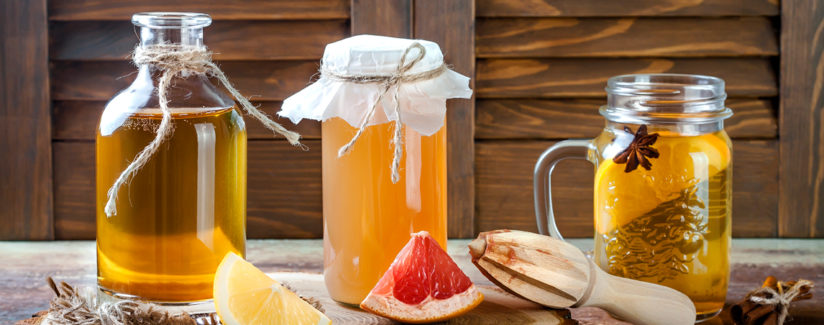
Kombucha: Your Latest Go-To Drink?
07/11/2017
Have you tried kombucha? This trendy new drink is actually very, very old. It has a distinctive taste and there have been claims about health benefits. We reached out to expert Anne Cundiff, RD, LD FAND, author and president of AE Huebert Consulting, to get to the bottom of this cool beverage.
To start us off, what is kombucha?
Anne Cundiff: “Kombucha is a form of fermented tea made by combining a SCOBY (symbiotic culture of bacteria and yeast), tea (usually green or black), and sugar, as well as varying flavorings or fruit juices. It is occasionally referred to as “mushroom tea” but this is a misnomer; that name refers to the fact that the SCOBY sometimes looks like a mushroom cap during production.”
The New York Times states that kombucha entered the health craze scene around 2003 or 2004 because people who had participated in the Atkins diet were looking for an alternative to replace drinking sodas and juices. They also wanted something that had a little bit of carbonation to it.
It’s fermented? What does that mean?
Cundiff: “Fermentation the chemical breakdown of a substance, carbohydrates, by bacteria, yeasts, or other microorganisms into acids, gases or alcohol. Common fermentation results in the production of beer, wine and other alcoholic beverages as well as leavening/yeast activity in bread products, lactic acid in foods like sauerkraut and yogurt and acetic acid in vinegars. “
Where did kombucha come from?
Cundiff: “Kombucha originated in Northeast China around 220 BC. It has recently become very popular and trendy, with many different varieties available to consumers. “
Here’s a crash course in the history of the fermented beverage. According to Forbes, kombucha originated in Northeast China for its “healing properties.” The name comes from Dr. Kombu, a Korean physician who brought kombucha to Japan. The tea spread from Japan to Europe. It gained popularity again in the 1990s as it was said to help in serious medical conditions such as AIDS and cancer. However, these claims are not scientifically verified.
So, what does kombucha tea taste like?
Cundiff: “Kombucha generally tastes acidic like vinegar and slightly sweet – this varies from brand to brand and flavor to flavor. There are usually hints of the flavor of the tea used when producing the kombucha mixed in with the other fruit, herb, or spice flavors added. “
Should I be drinking it? Are there any health benefits?
Cundiff: “I wouldn’t say you need to be drinking it. There are some health benefits related to the probiotics found within the beverage. There are many health claims made about Kombucha, but most of these are unfounded as there has been very little research done on human subjects. In summary: it’s not bad for you, the probiotics are good for you, and it might be good for you for other reasons, but the science does not confirm it.”
Can I brew kombucha tea myself? Or should I leave it to the professionals?
Cundiff: “You can make it yourself if you have an appropriate SCOBY, although there are some risks involved – care must be taken during production to avoid contamination. You can order a “SCOBY” or starter culture from a variety of companies. If you can make tea, you will be able to make your own Kombucha.
You can make it yourself if you are dedicated enough to do the required research and follow the instructions 100%, will taking the appropriate food safety measures. The acquisition of a SCOBY and maintaining a sterile environment during production can be difficult, and there are certainly more risks involved in making it yourself. I recommend you leave it to the professionals.”
If you’re wanting to take a walk on the wild side, learn how to brew your own Kombucha.
Is there any alcohol in kombucha tea?
Cundiff: “There are trace amounts of alcohol in kombucha (usually less 0.5%). The yeast in the SCOBY converts the sugar to alcohol, and then the bacteria in the SCOBY converts that alcohol to acetic acid. If the product is left to ferment too long it will become increasingly (perhaps even dangerously) acidic.”
Is it safe for kids to consume?
Cundiff: “I do not recommend consumption for children and it is not recommended for pregnant or lactating women.
Kombucha offers probiotic health benefits, but the other claims that have been made are not scientifically proven. If you grab a bottle, let us know what you think about this trendy (and not so new) drink.


























